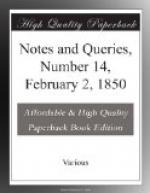I will not pretend to reply to the concluding queries of your correspondent, but I would just remark that, from what we know of the feeling of our ancestors respecting the remains of the dead, it appears probably that if from any cause a large quantity of human bones were found, or were from any cause obliged to be disturbed, some ecclesiastic or pious layman would take measures to have them removed to some consecrated spot where they might be safe from further molestation. They would hardly be treated in any such manner as Dr. Mantell states the bones removed by the railway engineers from the Priory ground at Lewes were treated. I remain, sir, your very obedient servant,
J.T.
Syndenham, Jan. 21. 1850.
* * * * *
Lines attributed to Hudibras.
Perhaps the following extract from a volume entitled The Relics of Literature, published by Boys and Co., Ludgate Hill, 1820, may prove interesting, as further illustrating the so frequently disputed passage which forms the subject matter of your first article in No. 12.:—
“Few popular quotations
have more engaged the pens of critics
than the following:—
’For he
that fights and runs away
Will live to fight
another day.’
“These lines are almost universally supposed to form a part of Hudibras; and, so confident have even scholars been on the subject, that in 1784 a wager was made at Bootle’s, of twenty to one, that they were to be found in that inimitable poem. Dodsley was referred to as the arbitrator, when he ridiculed the idea of consulting him on the subject, saying, ’Every fool knows they are in Hudibras.’ George Selwyn, who was present, said to Dodsley, ’Pray, sir, will you be good enough, then, to inform an old fool, who is at the same time your wise worship’s very humble servant, in what canto they are to be found?’ Dodsley took down the volume, but he could not find the passage; the next day came, with no better success; and the sage bibliopole was obliged to confess, ’that a man might be ignorant of the author of this well-known couplet without being absolutely a fool.’”
I have also the following memorandum in a common-place book of mine, but I do not remember from what source I transcribed it many years past:—
“The couplet, thus erroneously ascribed to the author of Hudibras, occurs in a small volume of Miscellaneous Poems, by Sir John Mennis, written in the reign of Charles the Second, which has now become extremely scarce. The original of the couplet may, however, be traced to much higher authority, even to Demosthenes, who has the following expression:— {211}
‘[Greek: Anaer ho pheugon kai palin machaesetai]’,
of which the lines are almost a literal translation.”
While on the subject of quotations, let me ask whether any of your correspondents can tell me where the passage, “Providence tempers the wind to the shorn lamb,” is to be found?




